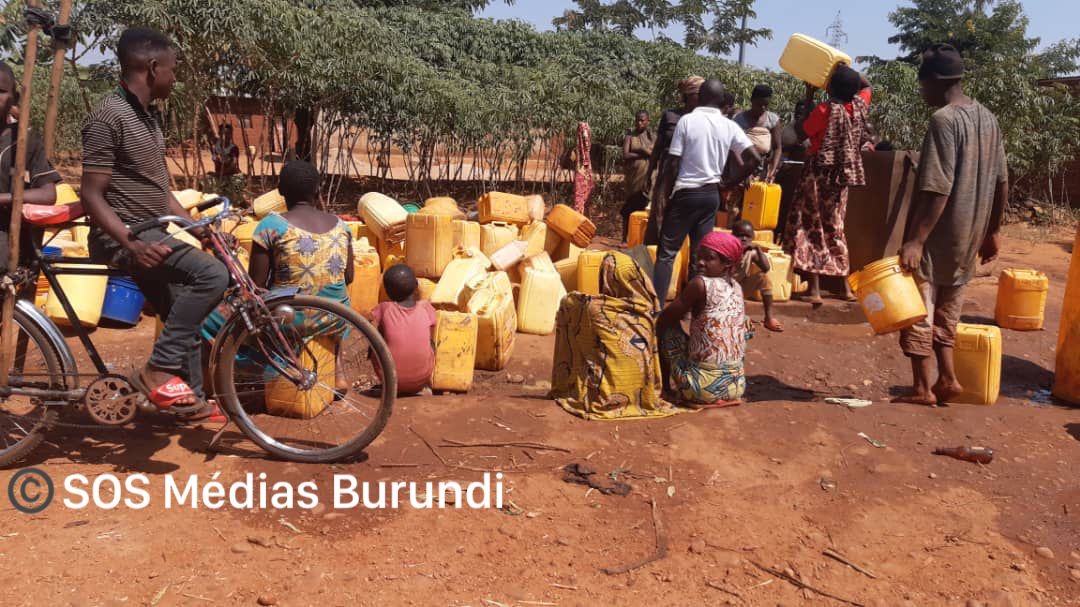Photo of the week : water shortage in the urban center of the province

Water is sorely lacking in the town center of Cibitoke province (northwest Burundi). For more than a week, not a drop was seen in the taps. The population fears the resurgence of diseases caused by uncleanness in a context marked by monkeypox. Regideso* speaks of an expansion of the city where water needs are skyrocketing.
INFO SOS Médias Burundi
The situation has become untenable in recent times and residents, according to concordant sources, are forced to travel several kilometers to get a few liters of drinking water in the provincial town center of Cibitoke.
In the meantime, queues are visible everywhere in front of a few public fountains that are still functional.
Bicycle taxis loaded with empty cans wander everywhere in search of water.
A local source indicates that water is so lacking that there has been a general increase in the price of a 20-liter can, which has gone from 500 to more than 700 Burundi francs, or even more.
The same source indicates that everywhere in homes, water for household chores, such as house ownership, laundry and cooking, is lacking.
The severe water shortage is also felt in the workplace and through health structures.
For the latter case, services of the hospital at the Cibitoke town center suffer greatly from the lack of drinking water.
As a result, hygiene leaves something to be desired, particularly in the operating room, maternity and pediatrics.
All internal medicine services, according to one of the members of the nursing staff, are facing a growing deficit of drinking water.
« We risk seeing a resurgence of diseases, including those caused by uncleanness, such as cholera and bacillary dysentery, » he insists.
Mpox haunts minds
A young doctor also does not hide his concerns.
According to him, the current shortage of drinking water is making a situation that is already harmful following the recent appearance of mpox.
For him, this epidemic, the prevention of which requires hand washing and cleanliness of public places, could be aggravated by this drinking water challenge.
The risk of spreading monkeypox is also highlighted by a public health specialist who adds that inhabitants of the Cibitoke center, particularly in the Rugombo district, are currently using very dirty water from the Nyamagana, Nyakagunda and Rusizi rivers.
In addition, he insists, « these watercourses used for irrigating rice-growing areas contain chemical substances harmful to human health. In addition, offices with sit-down toilets give off a nauseating odor ».
Occupants and beneficiaries of various toilets no longer frequent such places marked by filth following this severe lack of drinking water.
Faced with all these problems, the administration seems to be overwhelmed by events. One of the local authorities contacted does not hide his fear and is content to simply call on the population not to use river water.
According to the head of the Regideso branch in Cibitoke, « the drying up of most public fountains is due to this long dry season ».
Moreover, he continues, « the extension of the Cibitoke center and its surroundings means that the need for drinking water is growing ».
Georges Icintije indicates that to remedy this, « new sources of water are about to be set up », before calling on the population to properly maintain the existing water infrastructures.
But other sources within Regideso explain that most of the facilities of this water production and marketing company are dilapidated and are not replaced on time.
Some intellectuals living in this province criticize the work of Regideso which according to them « lacks technical expertise and financial means to both buy new equipment and maintain old facilities ».
The persistence of the water shortage in the urban center of this province in northwest Burundi worries more than one. A hygiene and sanitation expert finally urges Regideso to exploit the groundwater obtained by drilling to « supply the minimum of households and state services ».
Regideso*: the only state company in charge of water and electricity distribution in Burundi
Our photo : a still functional tap stormed by bicycle taxi riders and women looking for a drop of drinking water, September 2024 (SOS Médias Burundi)

